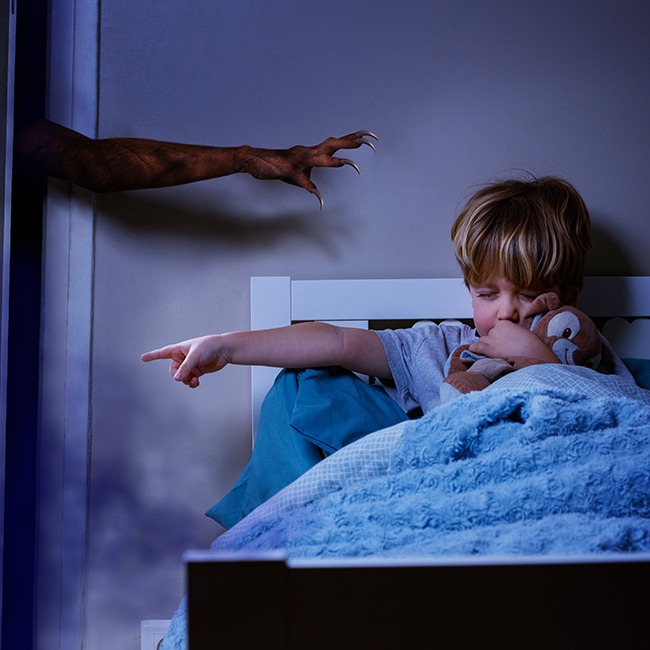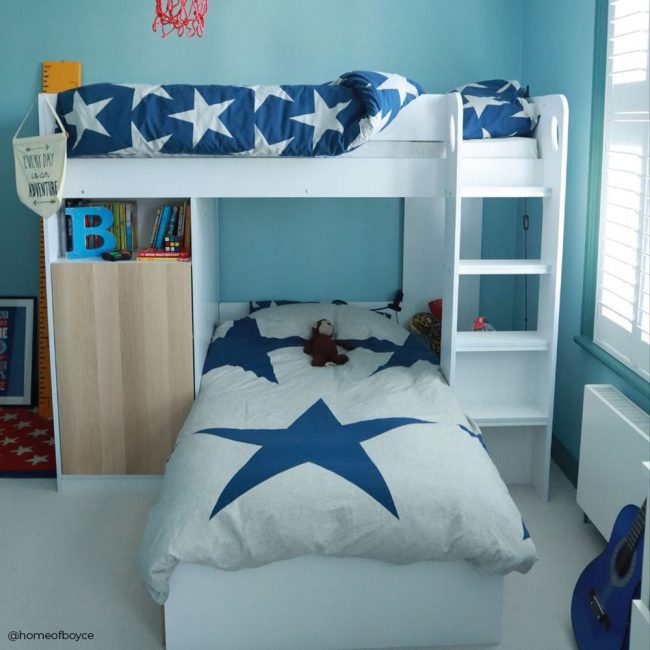What are the most Common Nightmares for Children? A How to Help Guide
Remember that time you were being chased by Godzilla and fell off a 50-story skyscraper? Or the time you turned up to work and realised you forgot to put on clothes? (We’re still not sure which was worse!)
Nightmares creep into all of our sleep sometimes, and whilst they’re never pleasant, they can be particularly distressing for children. If your little one wakes up in a cold sweat after a bad dream, it can be helpful to have some tactics ready to comfort them.
Here, we’ve collected some of the most common nightmares children experience, as well as our expert tips to help them have sweet dreams instead.
Top 5 Common Nightmares
Every child will experience different nightmares, but there are some frequently occurring themes. These are some of the most common:
- Monsters or animals chasing them
Children’s dreams often involve frightening creatures such as monsters, ghosts or aggressive animals. The monsters might be chasing them or otherwise making them feel unsafe. - Having no friends or being left out
Being on their own or left out is a common nightmare for children that might be heightened due to a falling out with their friends. - Teeth falling out
Up to 39% of people have experienced a nightmare about their teeth falling out or breaking, and children can have this dream too. It is sometimes thought to be caused by psychological stress, or it may be triggered by your child losing their baby teeth. - Falling or drowning
Many people experience the feeling of falling as they drift off to sleep and falling or drowning can be something children dream about when they’re feeling overwhelmed. - Getting lost
Similar to the nightmare of being alone, kids might dream about becoming separated from and unable to find their way back to their home or family.
Causes of Nightmares in Children
All children have nightmares occasionally, but certain factors might trigger them or make them more frequent. For example:
- Emotional distress or anxiety
Nightmares can be caused by emotional distress, which for a child could range from an argument with a friend to being told off by a parent or teacher. They can also be due to anxiety – for example, your child may experience separation anxiety when away from their family on a school trip. - Lack of control over life changes
Nightmares can also be triggered by a significant disruption to their life, which, as a child, they likely have no control over – such as a new sibling, moving house or having to change schools. - Interrupted sleep or illness
Dreams usually occur during the REM stage of sleep, at the end of the sleep cycle. If your child has an interruption to their deep sleep, for example, due to having a fever or getting up to go to the toilet, they might be more likely to have a nightmare. - Scary films or books
Monsters or villains that appear in their movies, TV shows, or books might lodge in your child’s sub-conscience and reappear in their dreams (we all remember that time we watched a horror film at a friend’s house and had to sleep with the lights on for a week!) - Trauma
Sometimes, nightmares can be a result of trauma or a sign of PTSD. If your child has experienced trauma or abuse, they may need therapy to help them deal with this and address their nightmares.
How to Help a Child with Nightmares
Although they are normal, it can still be distressing for a parent or caregiver to see your child upset after a nightmare. Here are some ways you can help:
- Reassurance
Reassurance is crucial after children suffer a nightmare. Kids often wake feeling panicked or anxious – be calm and comforting, and reassure them they are safe to help bring their heart rate back down. - Talk about their fears
It’s important to talk to your child about their fears and anything that might be worrying them. Do this in a relaxed and familiar setting so they are comfortable enough to open up to you. - Keep a sleep diary
One of the tactics recommended by the NHS for dealing with nightmares is to keep a sleep diary of everything that happened to your child during the day and how they felt and slept that night. This can help you identify any patterns and possible causes of nightmares. - Address underlying issues
If you discover your child is feeling upset about something in particular, try to address the cause of this and reduce their distress. If this is not possible, or your child is severely anxious, you might want to consider therapy. - Create a relaxing bedtime routine
A soothing bedtime routine can help your child feel relaxed before bed, which might improve their sleep quality and reduce nightmares. This routine might include a hot drink, a bath, music, and a (light-hearted) bedtime story.
Stick to a consistent bedtime – children who are worried about nightmares might try to delay going to bed, but this will only heighten their anxiety around sleep, so stay calm but firm.
- Teach them to self-soothe
For the occasional nightmare, a bunk bed or trundle bed, such as our Fraser Bookcase Bed with Trundle, can be handy, providing an instant spare bed if you need to stay in their room to comfort them.However, the Sleep Foundation warns that regular co-sleeping is linked to increased night-time waking. In the long term, it’s better to teach your child self-soothing techniques, such as deep breathing. It might also help to assign them a toy to be their sleeping partner who will protect them in your absence (Teddy to the rescue!)
Kid's Nightmare FAQs
At what age do kids start having nightmares?
Kids generally start having nightmares at around 2 years old.
Is it normal for a 7-year-old to have nightmares?
It is entirely normal for 7-year-olds to have nightmares. Some studies indicate that nightmares are most prevalent in children aged 7 – 9 years, whilst they may be less common in toddlers.
Should you wake a child having a nightmare?
It is generally not advised to wake a child who is having a nightmare. It may make them upset and disorientated and ensure they remember the dream, causing more distress. It may also take them longer to settle and get back to sleep.
What is the difference between a nightmare and a night terror?
Unlike nightmares, night terrors usually occur in the first few hours of sleep. Children might have outbursts involving opening their eyes, screaming or thrashing around, but they won’t usually remember the experience. For more information, check out our article on handling night terrors in children.
Should I take my child to the doctor about nightmares?
Consider taking your child to the doctor about their nightmares if they occur frequently i.e. more than twice a week for 6 months, if they are causing insomnia, or if you suspect your child has experienced trauma and may require treatment such as therapy.
Dreaming of Better Nights?
It’s horrible to see your little one upset after a nightmare, but these tips can help them (and you!) to feel better fast. And don’t forget, a Cuckooland kid’s bed is the perfect place for them to enjoy sweeter dreams!
If you have any questions about our kid’s furniture, contact our kid’s bed experts at customerservice@cuckooland.com.







